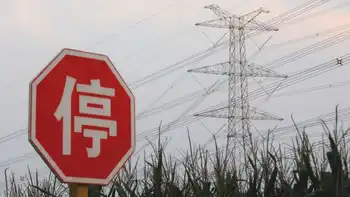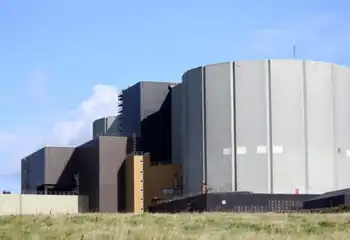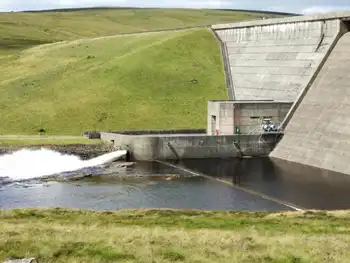AECL sitting on bomb-grade uranium
Since the Crown corporation pulled the plug in May on further development of two troubled MAPLE reactors at its Chalk River nuclear laboratories, officials have debated how to deal with the estimated 45 kilograms of highly enriched uranium (HEU) the United States exported to Canada for production of medical isotopes in the now-doomed reactors.
Whatever the options are now for the uranium, AECL isn't saying.
"We haven't made a final decision yet. For commercial and security reasons, I'm just not at liberty to discuss any details," spokesman Dale Coffin said.
David McIntyre, of the U.S. Nuclear Regulatory Commission, which authorized the export licences to ship the uranium to Canada, confirmed that his agency contacted AECL after it announced the death of the MAPLEs on May 16. But he, too, would not discuss the issue further.
The main barrier between terrorists and a nuclear catastrophe is the difficulty in obtaining uranium or the alternative bomb-making essential, plutonium.
The estimated quantity of fissile uranium at Chalk River is enough to build at least one nuclear bomb.
Non-proliferation advocates fear terrorists could strike and steal the material or carry out an act of radiological sabotage at the Upper Ottawa Valley site, two hours northwest of Ottawa. But it wouldn't be easy.
The site is guarded by an undisclosed number of armed Nuclear Response Force guards manning a series of defensive rings that become increasingly fortified with delay features moving toward the 100-acre main compound. And CFB Petawawa is next door.
Though he was reluctant to comment further, Mr. McIntyre said he was quoted correctly by a U.S. nuclear industry trade magazine in May saying if a viable option can't be found for the highly enriched uranium, such as possibly using it for isotope production in the aging NRU reactor at Chalk River, the material should be returned to the U.S.
Alan Kuperman, director of the Nuclear Proliferation Prevention program at the University of Texas and a longtime critic of Canada's continuing commercial use of uranium for isotope production, said using the pre-fabricated uranium targets intended for the MAPLE - the Multipurpose Applied Physics Lattice Experiment - reactors would require extensive modifications before it could be used in the NRU. What's more, the NRU already receives a steady supply of other U.S. uranium that is far more readily useable.
That means the MAPLE uranium is surplus to AECL's needs, "and it's U.S. policy to retrieve all excess material," Mr. Kuperman said. "That stuff has to come back as soon as possible."
And that may, in fact, be the plan, he said.
"My sources were telling me that AECL had agreed to the U.S. request that these targets must be returned forthwith, that's my understanding. If there's any hedging on that front now on the Canadian side, my guess is it's because some industry diehards are thinking they're going to get the MAPLE reactors actually started.
"If you believe the announcements that the MAPLE project is cancelled, and given that the U.S. is supplying fresh HEU for the NRU target, there's no conceivable reason to want to keep the MAPLE targets in Canada except to present a tempting target to terrorists.
"If anyone is trying to keep hope alive, then the returning of the MAPLE targets would be the stake in the heart, a clear sign the project is not going to come back from the dead."
The MAPLEs project was terminated after AECL bowed to seemingly insurmountable technical problems and enormous cost overruns.
For years, AECL and Ottawa's MDS Nordion, the world's leading producer of medical isotopes and former partner in the MAPLEs project, have weathered criticism over the use and stockpiling of uranium at Chalk River. An estimated 20 tonnes of "civilian" highly enriched uranium is stored around the world, primarily to fuel more than 100 research reactors in dozens of countries, some with questionable security.
Natural uranium found in the Earth's crust consists almost entirely of an atom called U-238. About 0.7 per cent is a related atom, or isotope, called U-235. Its nucleus can release energy by splitting into smaller fragments, which then hit and split other U-235 atoms, and so on. Enriching uranium means ensuring there is enough U-235 to maintain that chain reaction.
Low-enriched uranium is considered anything with less than 20 per cent U-235. Uranium enriched to three to five per cent, for example, is used to fuel reactors that generate electricity.
When the U-235 component is enriched to 90 per cent or more and the atoms are fissioned in the controlled conditions of a nuclear reactor, some important medical isotopes -namely Mo-99 - are created.
When injected into the body, it and other isotopes emit harmless amounts of radiation that can be traced by special equipment and quickly reveal disease and illnesses. U.S. physicians alone use them at least 50,000 times a day and an estimated 15 million to 20 million nuclear medicine procedures are performed annually. The MAPLEs HEU is enriched to 93.3 per cent.
Twenty-five to 50 kilograms is enough to make a simple nuclear bomb. The weapon that destroyed Hiroshima was built with about 60 kilograms of 80-per-cent enriched uranium.
Related News

Ontario to seek new wind, solar power to help ease coming electricity supply crunch
TORONTO - Ontario is working toward filling all of the province’s quickly growing electricity needs with emissions-free sources, including a plan to secure new renewable generation, but isn’t quite ready to commit to a moratorium on natural gas.
Energy Minister Todd Smith announced Monday a strategy to prepare the grid for 2030 to 2050 — the Independent Electricity System Operator projects Ontario’s electricity demand could double by mid-century — and next steps involve looking for new wind, solar and hydroelectric power.
“While we may not need to start building today, government and those in the energy sector need to start planning immediately,…





